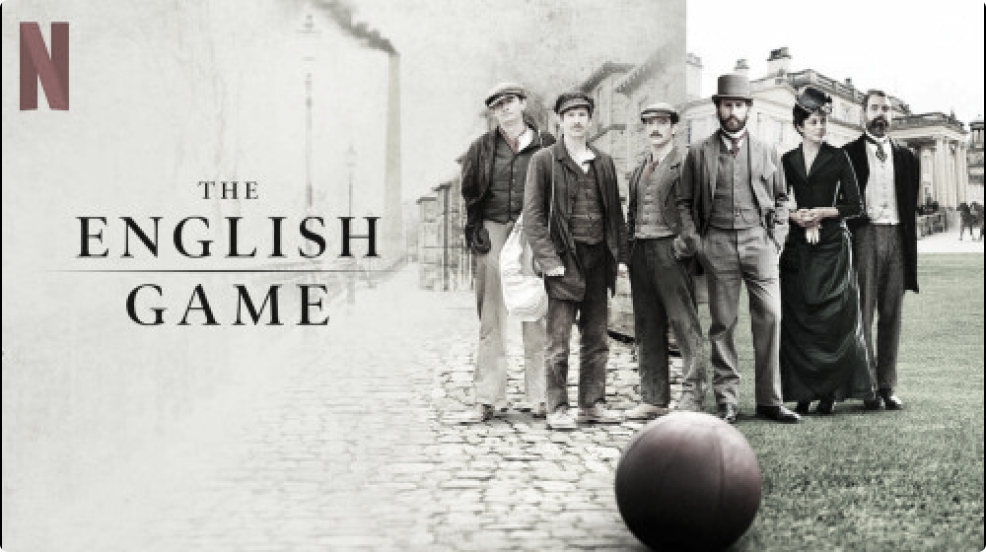"The English Game": Historical Netflix Show About How A Scotsman Changed Football Forever.
by SAGUNA SIDDHESHWARI
![]() Oct 30, 2021
Oct 30, 2021
EPL
0 Comments
1234 Views

In March, 2020 a new mini-series was released on Netflix called “The English Game”. It was classified as a “historical drama” and had been written by Julian Fellowes, the person also responsible for creating the famous series Downton Abbey. Me being a history and drama buff decided to watch it and to my surprise, it was all about football.
“The English Game” is about how football changed and evolved from a virtually unrecognisable sport, to the one we love today. It is also historically accurate to a surprising degree. It is set in Scotland and mostly England. The six episodes revolve around Fergus Suter, a Scottish mill worker who comes to England to play football with another friend. The story is set in the 1880s. This was a time when football was becoming truly popular as a sport. However, as is depicted in the show, it was largely dominated by the rich men – mill owners, merchants etc. in England. The characters depicted in the show are very accurate, as is the style of football. Before being the beloved sport that is known for its tactical side and its intricate passing, in the 1800s, football consisted of the players forming a long line by linking hands and using this odd style to run down the field to their opposition’s goal with the ball and score. It was much more physical than today with pushing, pulling etc. allowed in the rules. The now much admired concept of tiki taka was virtually unknown.
Apart from Fergus Suter, the other main character is a man named Arthur Kinnaird. An affluent man who was one of the first true stars of the game. He was not only known for his great physical force and skill on the field, he was also a great lover of the game and an honest player. In the early days of football, unlike its present reputation of being a middle class worker’s pastime, it was very much a rich man’s sport. A club called the Etonians was made of such rich, prosperous men. They completely dominated English football for a long time, winning the FA Cup almost without competition. Their main rivals tended to be clubs composed of the poor sections of society, mostly mill workers and stonemasons from the North of England etc. The clubs in focus in this series were The Old Etonians, Darwen FC (a millworkers team) and Balckburn. It was unheard of and in fact illegal to pay players. Yes, you heard that right. The workers who played for these clubs did so part time, working in the mills during the day. They were expected to play football for their teams for free, as a matter of pride.
This was part of the reason why the rich men’s teams were almost always successful over the northern millworkers teams. The rich men, like Kinnaird not only did not have to physically exhaust themselves to earn a living, they also had more time to practice and had better, sturdier boots. This, combined with the fact that they were the ones who wrote the rules and ran the Football Association, gave them an unfair advantage over the poor working mens’ teams.
This all changed when Fergus Suter and his friend Jimmy Love came from Scotland to England. It is a widely known fact that Suter was the first fully paid footballer. He was recruited by Darwen FC after the mill owner at Darwen heard of the skill and talent he showcased while playing in Glasgow. He offered him money, at that time against the rules, to come and play for Darwen in the hope of finally winning the FA Cup from the Old Etonians. Suter then left Darwen to join Blackburn Rovers. While the show justifies his decision by showing how he had to accept the offer to play for Blackburn to save his mother and sister from an alcoholic and abusive father, the truth is that Suter joined Balckburn solely for the extra money he was being offered.
It was Suter who also radicalized the playing style of football. Instead of running down the field with a wall of men, he realised it would be smarter if the ball was passed around from player to player. It was here that we can recognise football in the format it is played in today. This new strategy proved greatly successful. On their first encounter in 1882, Blackburn Rovers were unable to defeat Arthur Kinnaird’s Old Etonians in the FA Cup final, however Suter managed to lead his team to successive FA Cup victories from 1883 to 1886, thus cementing his place in the history of football as a true game changer. He was not afraid to challenge the rules and the norms, and it can be argued that much like Johan Cryuff, he is one of the reasons the game has evolved into what we play and love today
Tags
- EPL
- Premier League
- Football
Keywords
- EPL
- Premier League
- Football

